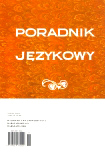KOBIETA KSIĄDZ I CO DALEJ? O PROBLEMACH JĘZYKOWYCH ZWIĄZANYCH Z ORDYNOWANIEM KOBIET NA DUCHOWNYCH
A woman priest and what next? About linguistic problems related to ordaining women
Author(s): Ewa BadydaSubject(s): Language and Literature Studies
Published by: Dom Wydawniczy ELIPSA
Keywords: Kobieta ksiądz; kapłaństwo kobiet; nazewnictwo; Mariawici; Protestanci; Ewa Badyda; formy żeńskie zawodów i profesji;
Summary/Abstract: The article analyses linguistic problems connected with the contemporary phenomenon of women entering the ministry. The discussed issue is focused on purely linguistic aspects, concerning the feminitive forms in Polish, and the cultural ones, referring to the titles of clergy. There are two possible ways of creating feminitive forms of titles, high positions and prestigious professions in Polish – by suffixal derivation and by leaving the masculine form uninflected, the latter being approved by the standard. However, the analysis of the language used on Internet information portals and in newspapers shows that beside the recommended forms (ta) ksiądz, (ta) pastor, (ta) biskup the suffixal forms and the expressions: pani pastor, pani biskup are widespread, the latter being also used as addressative forms. Referring to a woman bishop in the Catholic Mariavite Church as biskupka results from the need to emphasize its theological and cultural distinctiveness – the priesthood of women is the fundamental theological assumption of the church. In the case of churches of Protestant tradition the influence of a foreign language (German) is significant – those to whom the names refer belong to the environment of a foreign (German) language and the churches they represent are religious minorities in Poland, and hence the original titles were formed on the basis of a foreign language. Linguistic and cultural translation has to deal not only with the differences between etiquette rules in the two languages but also with the ones concerning the principles of word formation – deriving feminine forms from the masculine ones in German is highly regular, which allows to meet the requirements of gender equality in language. Referring to women priests, the occurrence new and still remote to Polish reality, is far from stabilization and it is difficult to say which of the tendencies observed will gain advantage in the future.
Journal: Poradnik Językowy
- Issue Year: 2011
- Issue No: 03
- Page Range: 30-43
- Page Count: 14
- Language: Polish
- Content File-PDF

